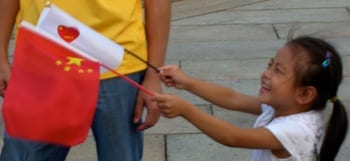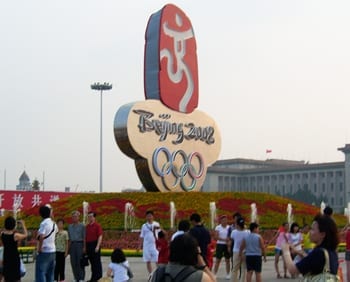I am lucky to be able to see Beijing in person during the Olympics. The athletic accomplishments aside–and the Chinese had 11 gold medals last I checked–the people’s pride in being a host to the games is palpable. 
Putting on the Olympics is a lot of work. Designing, constructing, staffing, planning, and delivering demand a significant amount of resources, including workers. Since the modern era of Olympics games (post-1896), organizers have recruited volunteers in addition to paid workers to help with all aspects of the hosting the games. Chinese who were interested in particating were given a choice between paid worker and volunteer. The Beijing Olympic committee hoped to recruit 150,000 to be volunteers–a lot even by Olympic standards–out of those who wanted to work.
Over 2 million people signed up to work and over 1.1 million of them as volunteers. Many of them students and retirees. I never realized how serious a commitment being an Olympic volunteer really is. The commitment is not just for the period of the games. For the last two years volunteers have attending training sessions including language training and cultural etiquette. Even the taxi and bus drivers were schooled in rudimentary English, acceptable etiquette, driving safety, and vehicle cleanliness. It is charming and maybe a little sad–much of the training seemed to be making Chinese behavior more in line with western standards. Now granted, I think no drunk driving is a good idea and I’m not a huge fan of spitting in public, so some of these social adjustments might make sense to me. At the same time, having to alter Chinese behaviors to be more palatable to western visitors raises some interesting cultural and ethical questions.
The young people I spoke with were charmingly earnest about the honor of being part of the Olympic event. They are proud of their country and are really eager to make China better understood and more appreciated around the world. “You know,” one young woman told me, “we are not like westerners. This is for all of us, this is for pride of our country.” I saw an interview on television where a man from the US said that the Chinese were not as he expected, he said the young and old were naive in a sense, or pure hearted. It is this earnestness that is so captivating in the young people we meet. There are volunteers all over the city, not just in the Olympic village. Many of the city sites are manned by students from the Language and Communication universities, using their language studies to help tourists find their way to venues and public transportation. A legacy of the games for China may well be the the involvement of citizens in organized community volunteerism, which according to CCTV 9, is not common in China. Because of the Olympics, Beijing now has a blueprint for further volunteer works on a significant scale that can be institutionalized into year-round services that are not crisis or event driven.
These games have many meanings, here and abroad. The importance manifests in good ways, such as the exuberance of the people. (I have been told “welcome to Beijing” pretty much every where we have gone.) Beijing has definitely had a face lift in many areas; and is decorated throughout for the events with banners running down the sides of buildings, Olympic displays in shopping areas. Improvements include not only construction, but hyper-attention to cleanliness in public areas such as highway underpasses and shopping malls. In a minor tragedy, I dropped part of an ice cream cone (a dipped in chocolate soft-serve from Dairy Queen), and barely had time to look for a trash can before a woman with a mop came up to take care of it. As an job works project, it appears to be extraordinarily successful.
The Internet access, on the other hand, has been frustratingly sketchy. Because we westerners are so paranoid about Chinese censorship issues, it is hard to rein in lurking bias about how this must be because the Chinese are censoring content. It is equally as likely that the surge of information flow and demand has taxed the system. Nevertheless, I have been unable to reliably get email and cannot access the Media Psychology Research Center website which has made me crabby, since my life is so fully intertwined with and addicted to communications technology.


 Dr. Pamela Rutledge is available to reporters for comments on the psychological and social impact of media and technology on individuals, society, organizations and brands.
Dr. Pamela Rutledge is available to reporters for comments on the psychological and social impact of media and technology on individuals, society, organizations and brands.